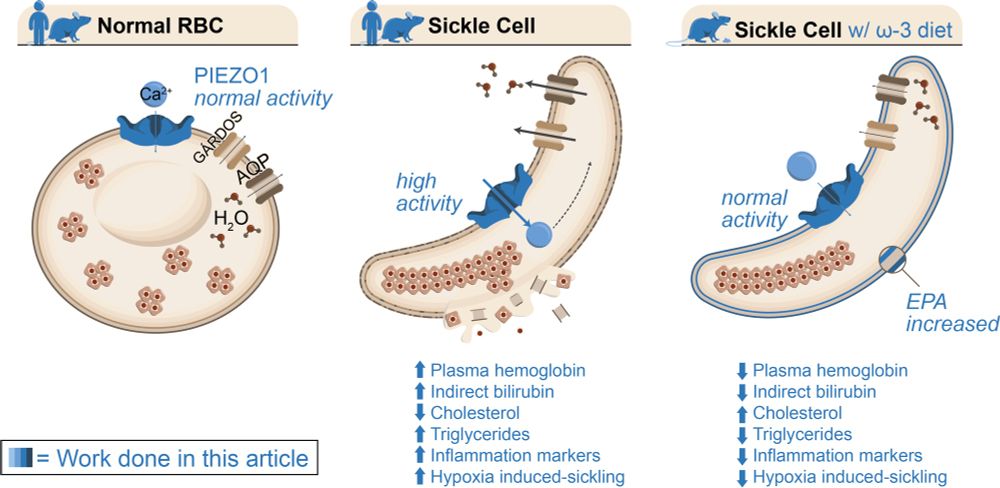Cordero-Vásquez Lab
@cvlab.bsky.social
Thanks to our team members (Luis Romero, Manisha Bade, Sonia Paz-López) and collaborators (Elisa Carrillo, Vasanthi Jayaraman @frettinglab.bsky.social , Syed Hasan, William James Antonisamy, and Zahoor Shah) 6/6
November 6, 2025 at 8:03 PM
Thanks to our team members (Luis Romero, Manisha Bade, Sonia Paz-López) and collaborators (Elisa Carrillo, Vasanthi Jayaraman @frettinglab.bsky.social , Syed Hasan, William James Antonisamy, and Zahoor Shah) 6/6
Our results highlight cytoskeletal dysregulation as a key driver of ion channel and behavioral deficits, and suggest that actin-binding proteins may be targets to enhance motor coordination and spatial learning in AS. 5/6
November 6, 2025 at 8:03 PM
Our results highlight cytoskeletal dysregulation as a key driver of ion channel and behavioral deficits, and suggest that actin-binding proteins may be targets to enhance motor coordination and spatial learning in AS. 5/6
currents in hippocampal neurons, and improves rotarod and T-maze performance in AS mice. 4/6
November 6, 2025 at 8:03 PM
currents in hippocampal neurons, and improves rotarod and T-maze performance in AS mice. 4/6
In Angelman syndrome (AS), disrupted F-actin affects mechanosensitive and glutamatergic signaling. We show that a first-in-class, selective cofilin inhibitor (SZ-3) stabilizes the actin cytoskeleton, increases cellular stiffness, restores PIEZO2 function in DRG neurons and glutamate-evoked 3/6
November 6, 2025 at 8:03 PM
In Angelman syndrome (AS), disrupted F-actin affects mechanosensitive and glutamatergic signaling. We show that a first-in-class, selective cofilin inhibitor (SZ-3) stabilizes the actin cytoskeleton, increases cellular stiffness, restores PIEZO2 function in DRG neurons and glutamate-evoked 3/6
It was nicely highlighted by Paige McKeon in “This Week in The Journal: www.jneurosci.org/content/45/4... 2/6

This Week in The Journal
Mechanistic Insight into Angelman Syndrome Treatments
Luis O. Romero, Manisha Bade, Elisa Carrillo, Sonia Paz-López, Syed A. M. Hasan et al.
(see article e0965252025)
People with Angelman syndrome...
www.jneurosci.org
November 6, 2025 at 8:03 PM
It was nicely highlighted by Paige McKeon in “This Week in The Journal: www.jneurosci.org/content/45/4... 2/6
(TMC, the world’s largest medical complex). 2/2
October 21, 2025 at 9:47 PM
(TMC, the world’s largest medical complex). 2/2
This study was a collaborative effort across multiple groups, led by our first graduate student, Dr.
Luis Octavio Romero, in partnership with graduate student Manisha Bade. 3/3
Luis Octavio Romero, in partnership with graduate student Manisha Bade. 3/3
October 3, 2025 at 4:53 PM
This study was a collaborative effort across multiple groups, led by our first graduate student, Dr.
Luis Octavio Romero, in partnership with graduate student Manisha Bade. 3/3
Luis Octavio Romero, in partnership with graduate student Manisha Bade. 3/3
PIEZO1 is abnormally overactive in sickle red blood cells (humans and mice). In mice, an EPA-enriched diet normalized PIEZO1 and reduced hemolysis, hypoxia-induced sickling, and downstream inflammation, suggesting a potential dietary strategy to support people living with sickle cell disease. 2/3

October 3, 2025 at 4:53 PM
PIEZO1 is abnormally overactive in sickle red blood cells (humans and mice). In mice, an EPA-enriched diet normalized PIEZO1 and reduced hemolysis, hypoxia-induced sickling, and downstream inflammation, suggesting a potential dietary strategy to support people living with sickle cell disease. 2/3

